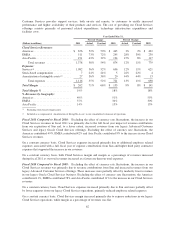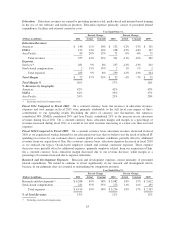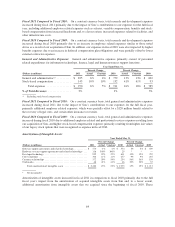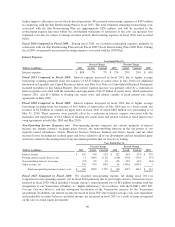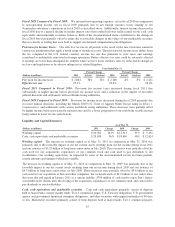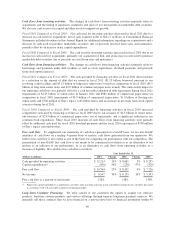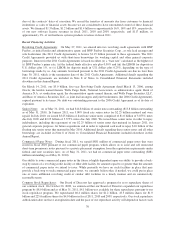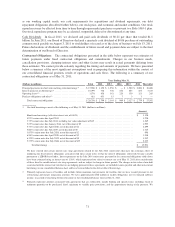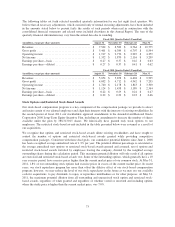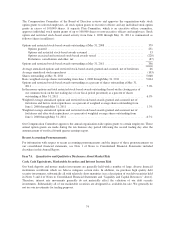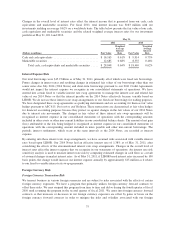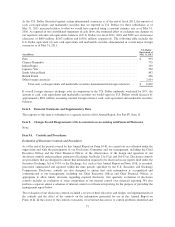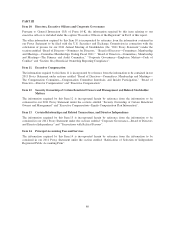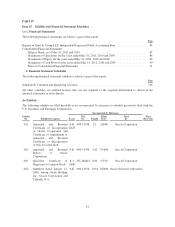Oracle 2011 Annual Report Download - page 74
Download and view the complete annual report
Please find page 74 of the 2011 Oracle annual report below. You can navigate through the pages in the report by either clicking on the pages listed below, or by using the keyword search tool below to find specific information within the annual report.utilize several external manufacturers to manufacture sub-assemblies for our products and to perform final assembly and testing of
finished products. We also obtain individual components for our products from a variety of individual suppliers based on projected
demand information. Such purchase commitments are based on our forecasted component and manufacturing requirements and typically
provide for fulfillment within agreed upon lead-times and/or commercially standard lead-times for the particular part or product and have
been included in the amount presented in the above contractual obligations table. Routine arrangements for other materials and goods
that are not related to our external manufacturers and certain other suppliers and that are entered into in the ordinary course of business
are not included in this amount as they are generally entered into in order to secure pricing or other negotiated terms and are difficult to
quantify in a meaningful way.
As of May 31, 2011, we have $3.8 billion of gross unrecognized tax benefits, including related interest and
penalties, recorded on our consolidated balance sheet and all such obligations have been excluded from the table
above due to the uncertainty as to when they might be settled. We have reached certain settlement agreements
with relevant taxing authorities to pay approximately $96 million of these liabilities. Although it remains unclear
as to when payments pursuant to these agreements will be made, some or all may be made in fiscal 2012. We
cannot make a reasonably reliable estimate of the period in which the remainder of our unrecognized tax benefits
will be settled or released with the relevant tax authorities, although we believe it is reasonably possible that
certain of these liabilities could be settled or released during fiscal 2012.
Subsequent to fiscal 2011, we agreed to acquire certain companies for amounts that are not material to our
business. We expect to close such acquisitions within the next twelve months.
We believe that our current cash, cash equivalents and marketable securities and cash generated from operations
will be sufficient to meet our working capital, capital expenditures and contractual obligation requirements. In
addition, we believe we could fund any future acquisitions, dividend payments and repurchases of common stock
or debt with our internally available cash, cash equivalents and marketable securities, cash generated from
operations, additional borrowings or from the issuance of additional securities.
Off-Balance Sheet Arrangements: We do not have any off-balance sheet arrangements that have or are
reasonably likely to have a current or future effect on our financial condition, changes in financial condition,
revenues or expenses, results of operations, liquidity, capital expenditures or capital resources that are material to
investors.
Selected Quarterly Financial Data
Quarterly revenues, expenses and operating income have historically been affected by a variety of seasonal
factors, including sales force incentive compensation plans. In addition, our European operations generally
provide lower revenues in our first fiscal quarter because of the reduced economic activity in Europe during the
summer. These seasonal factors are common in the high technology industry. These factors have caused a
decrease in our first quarter revenues as compared to revenues in the immediately preceding fourth quarter,
which historically has been our highest revenue quarter within a particular fiscal year. Similarly, the operating
income of our business is affected by seasonal factors in a consistent manner as our revenues (in particular, our
new software license and hardware systems products) as certain expenses within our cost structure are relatively
fixed in the short-term. We expect these trends to continue in fiscal 2012. Our quarterly revenues, expenses and
operating income were also impacted in the periods presented in the table below by our acquisition of Sun during
the third quarter of fiscal 2010, which added a significant amount of revenues and expenses to our results of
operations in comparison to our historical operating results.
72


